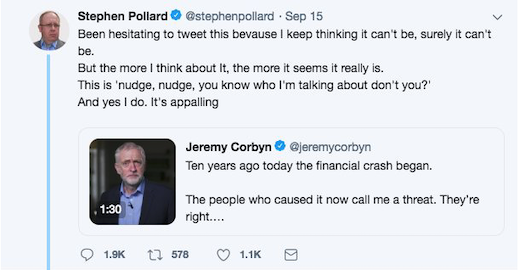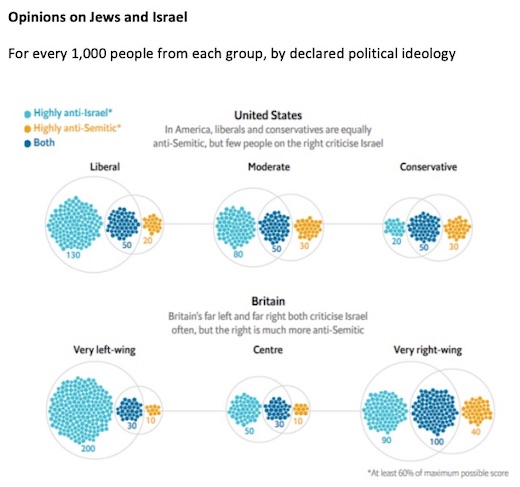
For a few months over the summer the British corporate media largely lost interest in smearing Labour leader Jeremy Corbyn as an anti-semite. Maybe they had begun to worry that the constant drum-beat of the past three years was deadening the public’s sensitivity to such claims.
But an election is now weeks away, and the anti-semitism smear bandwagon is being rolled out once again.
Stephen Pollard, editor of the Jewish Chronicle (who also writes for the Tory-loving Mail, Express, Sun and Telegraph newspapers) has yet again been terrifying readers as best he can, implying not so subtly that voting for Labour might risk a genocide of British Jews. After several years of painting Corbyn – preposterously – as some kind of unkempt, grey-bearded leader of a British Gestapo-in-the-making, Pollard spent the past few days highlighting in the corporate media the predictable results of the latest survey of Jewish public opinion. It suggests that a growing number of Jews are considering leaving Britain if Corbyn manages to oust Boris Johnson from power.
That we have reached the point where so many British Jews have been persuaded that Corbyn’s vocal criticism of Israel’s oppression of Palestinians means his entire party is infected with a supposed hatred of Jews needs some explaining. It is something I have been trying to do regularly, and in real time, as life has been breathed into these various slurs, both by a corporate media that detests the fairer society a Corbyn party promises and by an Israel lobby that identifies so closely with Israel that it has completely dehumanised Palestinians, to the extent that the crimes against them can be entirely overlooked – treated as no more significant than stepping on an ant.
In the figure of Pollard, we have a journalist who merges both outlooks, typified in this extraordinary tweet last year that at the time stunned even some of his followers but has now become a staple of the campaign against Corbyn and his democratic socialist politics. Efforts by the left to highlight the class war waged by an elite that’s been sucking the life out of the British economy to enrich itself have been maliciously recharacterised by Pollard and other rightwing journalists (some of whom ensconced themselves in the Labour party during Tony Blair’s rule) as an attack on Jews. But it is not the left that conflates the corporate elite with Jews, it is rightwing journalists like Pollard.

We shall return to this issue later in the post.
Jonathan Freedland’s libel
An incident at the weekend helped to illustrate just how organised and malevolent the anti-semitism smears against Corbyn truly are.
Jonathan Freedland, a supposedly liberal columnist at the Guardian newspaper and a BBC regular, again proved how he has been a key figure in weaponising this allegation against a Corbyn-led party. So eager is he to damage Labour and make sure it is no position to end a decade of Tory-imposed austerity that he threw aside all normal journalistic caution and published a libellous claim of anti-semitism against a potential Labour candidate in the coming general election.
Labour tell me that earlier reports of a candidate shortlisted in Birmingham Hall Green rested on a confusion about two men with the same name. The Majid Mahmood shortlisted for the seat is NOT the Majid Mahmood fined over comments on Facebook – and I’ve deleted those tweets
— Jonathan Freedland (@Freedland) November 8, 2019
There were several revealing aspects to this incident. Freedland defamed Majid Mahmood, a Labour local councillor in Birmingham, without making even the most rudimentary factual checks that the highly damaging claim was actually true – a basic journalistic duty. He simply relied on the word of a “previously reliable Labour source” – in other words, one of the many Blairite enemies of Corbyn within the Labour parliamentary faction and party bureaucracy who have been briefing against the leader for the past four years.
(It is worth recalling that a prominent anti-racism activist, Marc Wadsworth, was hounded from the party last year, accused of anti-semitism, for warning that Blairite MPs like Ruth Smeeth were briefing against their own leader to journalists in the rightwing press. Smeeth accused Wadsworth of anti-semitism because she is Jewish, though Wadsworth says he did not know that – and, of course, her Jewishness is irrelevant to the issue of whether she was seeking to malign her own party’s leader through the media. Wadsworth’s mistake, it seems, was to assume that corporate “liberal” journalists like Freedland were not also part of those smear efforts.)
In Mahmood’s case, it was an egregious example of mistaken identity. Freedland and his “source” had confused the Birmingham councillor with a London lawyer of the same name who was fined over anti-semitic comments four years ago. Such confusion was clearly neither accidental nor innocent. Mahmood’s case highlighted something that was already patently obvious: that anti-Corbyn groups have been trawling the histories and social media posts of Labour members in an organised effort to weaponise anything they can find against the Labour leader. The defamation of Mahmood was simply the latest smear to emerge from this campaign.
Smears from within Labour
But Freedland’s “defence” was itself telling. The person relaying the smear to him was, he said, from inside Labour and had been “previously reliable”. That meant someone fairly senior in the party – thereby explaining Freedland’s readiness to believe him uncritically – and someone who had passed on similar damaging information before. It was irrefutable confirmation that Corbyn’s most venomous opponents are not in the Conservative party but drawn from Labour’s own top ranks. They want a Corbyn-led party destroyed even if it means keeping the Brexit-backing, austerity-loving, racism-indulgent Tories in power.
There was another ugly aspect to the behaviour of Freedland and his “source”. It looked suspiciously like both had uncritically accepted the unfounded claim against Mahmood because he had a Muslim name. They both appeared to have assumed that Muslims are more likely to be racist towards Jews and therefore accepted the claim with a much lower standard of evidence than they would have been expected in the case of anyone else.
In fact, the councillor’s name is a Muslim equivalent of “David Brown” or “George Smith”. Can we really imagine Freedland libelling someone with either of those names so casually, without making even cursory checks to be sure he had identified the right David Brown or George Smith?
This kind of behaviour has a name: it is called racism. And it is quite extraordinary to see Freedland so susceptible, after he has made a journalistic career out of exploring the intricacies of racism when it applies to Jews. It almost leaves one suspecting that this paragon of liberal journalism is really a hypocrite.
Fears the free lunch will end
The anti-semitism smear campaign is being revived in the corporate media for good reason. The stakes could not be higher for Britain’s ruling class. As worried as many of them are by Brexit, Corbyn is seen as a bigger threat. He might call time on the banquet they have been gorging on for four decades uninterrupted.
If Corbyn shunts Boris Johnson and the Tories out of power, the millionaires and billionaires who control both the British print and broadcast media, including the BBC, fear the good times could come to an abrupt end. The Brexit threat pales in comparison. That would simply shift our primary economic allegiance from Europe to the United States, leaving the predatory capitalism on which the corporate class has grown unimaginably rich as strong as ever.
A Corbyn government, by contrast, is an unknown quantity. The free-lunch might end, or at least start to feel more like an unsatisfying snack.
In truth, given the bitter divisions tearing apart his own party – between most of the mass membership, who are behind him, and the holdouts from the Blair-Brown era that still dominate the parliamentary party – it is hard to imagine Corbyn being able to do as much as his critics fear.
He may manage to curb the worst excesses of the neoliberal financial system, he may block further privatisation of the NHS, even reverse it a little, and he may bring a few vital national industries back into public ownership. He may manage too to redirect some of the cream the fat cats have been lapping up back into the public coffers for a New Green Deal. All of that would be a relief after so many years of Tory-designed austerity for the many and state socialism for the few.
But the corporate class are now so greedy, so used to getting their way, that even the smallest diminishment of their power and wealth is seen as an unbearable offence against what they divine as the natural order.
A tool of class war
They are not about to leave anything to chance. Corbyn must be tarred and feathered again. Four years of experimenting with various smears have selected anti-semitism as the weapon of choice. That false accusation can most easily be disguised to ensure it does not look like what it is intended to be when used against Corbyn and Labour: a tool of class war.
Claims of anti-semitism have worked ideally in damaging Corbyn because no real evidence has been needed. In fact, such claims succeed even when opposed to the known evidence (as we shall see). They work chiefly by innuendo and emotion. And better still, they work even when those accused like Corbyn and his allies deny the accusation. As in all good witch-hunts, denial is proof of guilt, as an ally of Corbyn’s, the MP Chris Williamson, has repeatedly found out. He has been barred from standing in the election, and has now resigned from the party, after correctly noting that Labour had in effect made the anti-semitism smears appear more credible by constantly apologising over evidence-free claims of anti-semitism from those seeking to harm the party’s image with voters.
This is a winning formula for the ruling class because anyone who tries to argue that Corbyn’s opponents are weaponising anti-semitism through the corporate media is thereby proved to be an anti-semite. The smears are entirely resistant to all evidence that they are smears.
Survey: little anti-semitism on left
That the anti-semitism claims are slurs has been demonstrated over and over again. But paradoxically the latest refutation came last week from the corporate elite’s house journal, the Economist – though, of course, it was not presented that way .
The magazine published a new survey of British public opinion showing that an ideological group it labelled as “very left wing” – presumably the people who share Corbyn’s views – were among the least likely to hold anti-semitic opinions, even though they also had by far the most critical views of Israel (an outlook the Economist mischievously termed “highly anti-Israel”).
In other words, those people on the left who firmly oppose Israel’s oppression of the Palestinians were unlikely also to harbour anti-Jewish views. The great majority could clearly distinguish between Israel and Jews, and did not hold Jews responsible for the crimes committed by the state of Israel.

The same could not be said, however, of either the centre or the right. Supporters of the right were less than half as likely to adopt critical views of Israel as the left but were three and a half times more likely to hold anti-semitic views. Meanwhile, only a small number of centrists were critical of Israel, and an almost identical number held anti-semitic views.
What the figures reveal is the very opposite of the Labour anti-semitism narrative – unless we wish to argue improbably that Labour and its 500,000 members (the largest party in Europe) are entirely unrepresentative of the wider public that shares their ideological worldview. The left overwhelmingly opposes Israeli colonial oppression of Palestinians but very few blame Jews for Israel’s behaviour. Israel is seen as a political project, one driven by an ugly ideology of settler colonialism, not a project representing all Jews. The latter is an anti-semitic position that, paradoxically, is supported and promoted by Israel itself.
Conversely, the same figures suggest that there is an identifiable problem of racism and anti-semitism on the right, and a potential one among centrists too. Whereas the left understands that Israel and Jews are entirely separate and distinct categories, both the centre and right appear to share a tendency of conflating Israel and Jews.
Racism rife on the right
In the case of the right, the figures show a close correlation between opposition to Israel and anti-Jewish feeling. A significant portion of the right either blame Jews collectively for Israel’s crimes or dislike Jews and so oppose the state that claims to represent them. Even though you would never know it from the media coverage, which concentrates exclusively on a supposed problem within the Labour party, anti-semitism is rife on the right in a way that simply isn’t true on the left.
The survey also hints at the possibility of a more veiled problem of racism and latent anti-semitism among “centrists”, a group presumably represented politically by the Lib Dems and the Blairite wing of the Labour party. Very few in this group express anti-Jewish sentiments – in fact, exactly the same small proportion as on the left. (Tellingly, despite these identical results, the Labour party has been smeared as “institutionally anti-semitic”, whereas the centrist Lib Dems have not.)
Nonetheless, there is a significant difference between the two political blocks – and one that could reflect much less well on the centrists than the left.
A much larger proportion of the centrist group appear to harbour sympathies for Israel, or at least view it uncritically, despite the ever mounting evidence of Israel’s record of human rights abuses and intensifying oppression of Palestinians.
Remember that large numbers of the centrist Blairite faction of Labour MPs (though not the wider Labour membership) belong to Labour Friends of Israel (LFI) and have proudly maintained their association with that organisation. They have continued to do so even after the LFI at first vigorously defended, then fell silent on Israel’s repeated massacres over the past 18 months of Palestinians protesters at the Gaza perimeter fence that encages them.
More than 220 Palestinians, including women, children, journalists, and medical staff, have been killed by Israeli snipers at the protests, while tens of thousands more have been maimed. But in a blatant example of anti-Arab racism, the LFI has blamed Hamas for these deaths, as though ordinary Palestinians in Gaza are simply pawns of Hamas and lack the volition to demand for themselves an end to an Israeli blockade that has imprisoned them for 12 years.

Centrists conflate Jews and Israel
Only a quarter as many centrists as leftists are critical of Israel, according to the Economist survey. In other words, a proportion of centrists appear to identify with Israel’s colonial oppression of Palestinians – possibly because they favour Jews over Arabs and Muslims (presumably as part of a “clash of civilisations” worldview) or maybe because they have positive feelings about Jews that translate into uncritical support for Israel, whatever it does to the Palestinians it rules over.
That could indicate a significant problem of anti-Arab or anti-Muslim prejudice among centrists, similar to the ugly assumptions made by Jonathan Freedland and his “source”. However, we can do little more than speculate on this point because the survey is concerned exclusively with Jews and Israel.
Nonetheless, the figures also allude to a potential anti-semitism problem in the ranks of the centrist camp. The stark lack of criticism of Israel among centrists, combined with little anti-semitism, suggests that a significant proportion of centrists, like rightwingers, consider Jews and Israel to be intimately connected – that they struggle to disentagle a political project (Israel) from an ethnic or cultural group (Jews).
There is only a narrow distinction between a rightwinger who conflates Israel and Jews in a way that vilifies Jews and a centrist who conflates Israel and Jews in a way that venerates Israel.
Rejecting universal rights
The difference in the respective outcomes of this conflation could reflect differing understandings of what Israel does. Israel’s treatment of Palestinians – whether seen as justified or not – is then projected on to Jews. Once the conflation is accepted, Jews unfairly receive either credit (from centrists) or blame (from the right) for Israel’s actions.
Or, more likely, the rightwingers and centrists who conflate Israel and Jews – as a proportion appear to do – are equally indulgent of a particularist and regressive approach to rights. Instead of committing to universal human rights, shared by all alike, the particularists assign superior rights to those they think of as more like themselves. Rightwingers, it seems, tend to exclude Jews from this category, while centrists have a greater tendency to include them.
But the danger is that, if these centrists can be persuaded that Jews are not part of their in-group – for example, by undermining the idea of a supposed Judeo-Christian West, embodying the supposed values of “civilisation” – then they could be as susceptible as the right to a generalised Jew hatred. It is a commitment to universal human rights – a doctrine to which most on the left subscribe but which some on the right and the centre appear to reject – that provides the only sure-fire political inoculation against racism in general and anti-semitism in particular.
The Economist, of course, wishes to avoid drawing this very obvious conclusion, one implied by its findings, because that would wreck the narrative it and the rest of the corporate media have been constructing to damage Corbyn. In fact, the Economist poll echoes earlier research ignored by the corporate media, such as figures showing that instances of antisemitism in Labour amount to 0.08% of the membership, and surveys demonstrating that the Tory party – and its “watermelon smiles” leader Boris Johnson – have a far bigger problem with racism, towards both Muslims and Jews.
‘Not a whiff of anti-semitism’
Not everyone in the political and media class is ready to dance to the same tune, as was made clear in an interview that gently turned the tables on Alastair Campbell, chief adviser to Tony Blair when he was Labour prime minister. Campbell helped Blair distort the intelligence in the run-up to the Iraq war in 2003 that gave superficial credence to a different but equally confected story: both that Saddam Hussein’s Iraq had weapons of mass destruction and that those weapons were just a hair’s-trigger away from being fired at the UK. Up to 1 million Iraqis were killed as a result of that illegal war, and many millions more were driven from their homes.
Campbell, a man whose anti-Muslim, anti-Arab prejudices permitted him to help lay waste to another country on an entirely bogus pretext, and whose reputation in the corporate media suffered not a whit as a result, decided to use the interview to try to revive the Corbyn anti-semitism smears and undermine Labour’s chances of winning the election. Like other Blairites, Campbell has been an outspoken critic of Corbyn, even going public with the fact that he has started voting for the Lib Dems.
He asked his interviewee, John Bercow, the outgoing Speaker of the House of Commons and a Jewish member of the Conservative party, to comment on Corbyn and the anti-semitism allegations. Campbell’s transparent aim was to recruit Bercow to the smear campaign – both as a Jew and as someone who has come to be widely trusted since becoming House Speaker as an arbiter of an even-handed politics.
Bercow’s response was not what Campbell hoped for. The former Speaker answered cautiously, but observed: “I myself have never experienced anti-semitism from a member of the Labour party … I do not myself believe Jeremy Corbyn is anti-semitic … I have known him for the 22 years I have been in parliament … and I have never detected so much as a whiff of anti-semitism from him.”
Campbell’s face could barely conceal his disappointment.
The interview was another reminder that those leading the anti-semitism smear campaign often have, given their own histories, precisely zero credibility on the issue of racism, let alone class politics. Whatever they may think they believe, it is not racism that truly concerns Campbell or Freedland; it is their fear of a different kind of politics, one that requires from them an entirely different way of understanding British colonial history, of interpreting Britain’s role in the world, and of ending the UK’s gaping class divide. They, like so many others in the media and political elite, are frightened that a different kind of politics might force them to look in the mirror – and finally understand that long ago they chose to stand with the oppressors rather than the oppressed.











